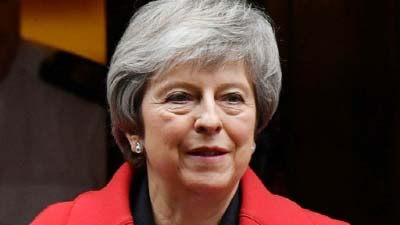
AFP, London :
Conservative Brexiteers, having spent their entire careers railing against the European Union, are resisting pleas from Theresa May to support her deal and could try to unseat her in the aftermath of next week’s vote.
The prime minister has already survived a half-hearted coup from the EU’s most ardent opponents, the party’s so-called European Research Group (ERG), but will be under severe pressure if her deal is sunk as seems likely.
She commands a wafer-thin majority in parliament, and with opposition parties promising to vote the deal down, she cannot afford to lose more than a handful of her own MPs. But around 100 have so far said they are opposed to the agreement, throwing the whole process into chaos with less than four months to go before Britain leaves the EU.
Their concerns have deepened after government legal advice revealed a risk that Britain could end up indefinitely stuck in an awkward customs arrangement with the European Union, with Northern Ireland as a separate economic entity.
May has tried to win them over, acknowledging on Wednesday the “concerns” raised by fellow Conservatives.
“I’m continuing to listen to colleagues on that and considering a way forward,” she told MPs.
Brexiteers have also appeared unconcerned by her warnings that if they vote against the agreement on Tuesday Britain may not end up leaving the EU.
The ERG fell short of securing the 48 letters needed from MPs to trigger a no-confidence vote, but following a defeat for May in parliament next week they could have more luck. The group was originally set up in 1993 to oppose Britain’s continued integration into the European Community through the Maastricht Treaty.
Many of its key players are veterans of that battle and are ideologically bent on leaving the EU at almost any personal or political price, having already helped bring down then prime minister John Major over the issue.
“They put leaving the European Union probably above everything else, including party loyalty,” said Nick Wright, teaching fellow in EU Politics at University College London.
“They just want to get us to the 29th of March and they don’t care if there’s a no-deal-once we’re out we’re out.”
Among this group, nicknamed the “Paleosceptics” by journalist Tim Shipman in his Brexit book “All Out War”, are former Tory party leader Iain Duncan-Smith, Bernard Jenkin, Owen Paterson, Bill Cash and Peter Bone.
They formed the backbone of the official Leave campaign during the 2016 referendum, but ran into frequent conflict with its combative leader Dominic Cummings.
“His narrative was that the eurosceptics were completely incompetent and their image was hopeless,” Jenkin told Shipman, with Cummings believing them to be naive and obsessed with “constitutional abstractions”.
Fellow Conservative MP Jacob Rees-Mogg took over leadership of the group after it was relaunched in 2016 to lobby for Britain to leave all of the EU’s institutions as part of a deal.
Conservative Brexiteers, having spent their entire careers railing against the European Union, are resisting pleas from Theresa May to support her deal and could try to unseat her in the aftermath of next week’s vote.
The prime minister has already survived a half-hearted coup from the EU’s most ardent opponents, the party’s so-called European Research Group (ERG), but will be under severe pressure if her deal is sunk as seems likely.
She commands a wafer-thin majority in parliament, and with opposition parties promising to vote the deal down, she cannot afford to lose more than a handful of her own MPs. But around 100 have so far said they are opposed to the agreement, throwing the whole process into chaos with less than four months to go before Britain leaves the EU.
Their concerns have deepened after government legal advice revealed a risk that Britain could end up indefinitely stuck in an awkward customs arrangement with the European Union, with Northern Ireland as a separate economic entity.
May has tried to win them over, acknowledging on Wednesday the “concerns” raised by fellow Conservatives.
“I’m continuing to listen to colleagues on that and considering a way forward,” she told MPs.
Brexiteers have also appeared unconcerned by her warnings that if they vote against the agreement on Tuesday Britain may not end up leaving the EU.
The ERG fell short of securing the 48 letters needed from MPs to trigger a no-confidence vote, but following a defeat for May in parliament next week they could have more luck. The group was originally set up in 1993 to oppose Britain’s continued integration into the European Community through the Maastricht Treaty.
Many of its key players are veterans of that battle and are ideologically bent on leaving the EU at almost any personal or political price, having already helped bring down then prime minister John Major over the issue.
“They put leaving the European Union probably above everything else, including party loyalty,” said Nick Wright, teaching fellow in EU Politics at University College London.
“They just want to get us to the 29th of March and they don’t care if there’s a no-deal-once we’re out we’re out.”
Among this group, nicknamed the “Paleosceptics” by journalist Tim Shipman in his Brexit book “All Out War”, are former Tory party leader Iain Duncan-Smith, Bernard Jenkin, Owen Paterson, Bill Cash and Peter Bone.
They formed the backbone of the official Leave campaign during the 2016 referendum, but ran into frequent conflict with its combative leader Dominic Cummings.
“His narrative was that the eurosceptics were completely incompetent and their image was hopeless,” Jenkin told Shipman, with Cummings believing them to be naive and obsessed with “constitutional abstractions”.
Fellow Conservative MP Jacob Rees-Mogg took over leadership of the group after it was relaunched in 2016 to lobby for Britain to leave all of the EU’s institutions as part of a deal.

